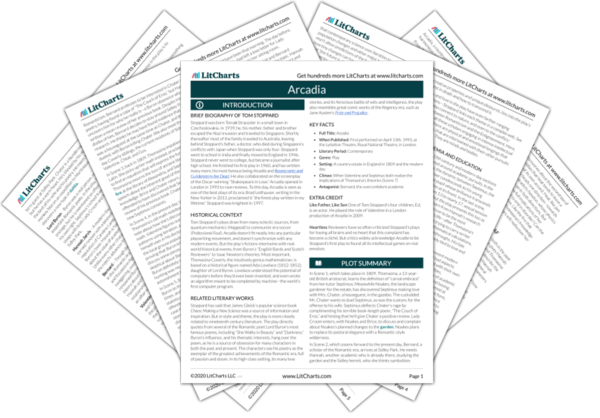Thomasina’s project, tragically cut short by her early death, is to find a formula that will express not lines, circles, or other perfect geometric shapes, but the natural forms of nature: “If there is an equation for a curve like a bell, there must be an equation for one like a bluebell” (Act 1, Scene 3). Thomasina also believes that a comprehensive formula to describe nature will allow her to predict the future. She makes several discoveries, even without advanced knowledge of math. One breakthrough is her understanding that hot things cool down to room temperature, but room temperature things don’t heat up, a concept that Newton did not describe in his laws of physics. In the modern day, Valentine, who studies similar topics at Oxford, interprets Thomasina’s discovery, explaining how this one-directional type of physics relates to the universe’s tendency towards equilibrium: “It’ll take a while, but we’ll all end up at room temperature” (82). Energy tends to leave, not arrive. So although the future is not as specifically predictable as Thomasina would like, she’s correct that what’s true of a bowl of rice pudding is true of the universe, and they both end up at the same low-energy point.
Another significant piece of Thomasina’s exploration is the graphing she makes by iteration, using the result of the previous function to make a new function. Valentine explains that contemporary science uses iteration to understand population changes and other major topics. However, iteration won’t allow predictions of the future either—instead, it shows how tiny changes can have a huge effect, and demonstrates that “the future is disorder” (Act 1, Scene 4). Thomasina’s discoveries and her focus on destiny not only link her to Valentine, but also to the play’s larger concerns about beauty, death, and truth.
Mathematics, Nature, and Fate ThemeTracker

Mathematics, Nature, and Fate Quotes in Arcadia
When you stir your rice pudding, Septimus, the spoonful of jam spreads itself round making red trails like the picture of a meteor in my astronomical atlas. But if you stir backward, the jam will not come together again. Indeed, the pudding does not notice and continues to turn pink just as before. Do you think this is odd?
God’s truth, Septimus, if there is an equation for a curve like a bell, there must be an equation for one like a bluebell, and if a bluebell, why not a rose? Do we believe nature is written in numbers?
I, Thomasina Coverly, have found a truly wonderful method whereby all the forms of nature must give up their numerical secrets and draw themselves through number alone.
When your Thomasina was doing maths it had been the same maths for a couple of thousand years. Classical. And for a century after Thomasina. Then maths left the real world behind, just like modern art, really. Nature was classical, maths was suddenly Picassos. But now nature is having the last laugh. The freaky stuff is turning out to be the mathematics of the natural world.
The unpredictable and the predetermined unfold together to make everything the way it is. It’s how nature creates itself, on every scale, the snowflake and the snowstorm. It makes me so happy.
…There’s an order things can’t happen in. You can’t open a door till there’s a house.
















